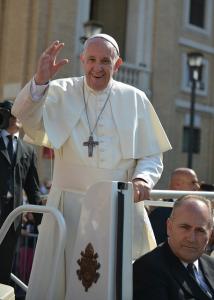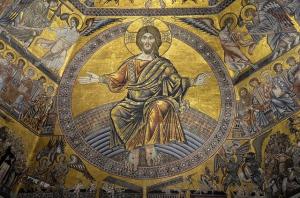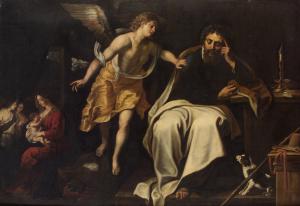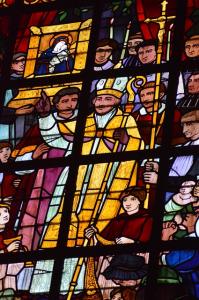Palm Sunday
Matthew 21.1-11, Mark 11.1-11, Luke 19.28-44, John 12.12-19
Hail Eärendil, of mariners most renowned, the looked for that cometh at unawares, the longed for that cometh beyond hope! Hail Eärendil, bearer of light before the Sun and Moon! Splendor of the Children of Earth, star in the darkness, jewel in the sunset, radiant in the morning!
—J. R. R. Tolkien, “The Silmarillion”
Fig Monday
Matthew 21.12-22, Mark 11.12-26, Luke 19.45-46, John 12.20-26
I taught her, as men teach a parrot, to say, “Lies of poets,” and “Ungit’s a false image.” I made her think that ended the question. I never said, Too true an image of the demon within. … And the real gods more alive. Neither they nor Ungit mere thoughts or words. I never told her why the old Priest got something from the dark House that I never got from my trim sentences. Of course, I didn’t know; but I never told her I didn’t know. I don’t know now. Only that the way to the true god is more like the house of Ungit … oh, it’s unlike too, more unlike than we yet dream, but that’s the easy knowledge, the first lesson; only a fool would stay there, posturing and repeating it. The Priest knew at least that there must be sacrifices. They will have sacrifices—will have man.
—C. S. Lewis, “Till We Have Faces”
Temple Tuesday
Matthew 21.23-26.2, Mark 11.27-13.37, Luke 19.47-21.38, John 12.27-50
The old shirt he wore to sleep in was open down the front and showed three strands of barbed wire, wrapped around his chest. “What’s that wire around you for? It’s not natural.”
After a second he began to button the shirt. “It’s natural,” he said.
“Well, it’s not normal. It’s like one of them gory stories, it’s something people have quit doing—like boiling in oil or being a saint or walling up cats,” she said. “There’s no reason for it. People have quit doing it.”
“They ain’t quit doing it as long as I’m doing it. I’m not clean,” he said.
She stood staring at him, unmindful of the broken dishes at her feet. “I know it,” she said after a minute, “you got blood on that nightshirt and on the bed. You ought to get you a washwoman …”
“That’s not the kind of clean,” he said.
“There’s only one kind of clean, Mr. Motes,” she muttered. “It’s easier to bleed than sweat, Mr. Motes,” she said in the voice of High Sarcasm. “You must believe in Jesus or you wouldn’t do these foolish things. You must have been lying to me when you named your fine church. I wouldn’t be surprised if you weren’t some kind of a agent of the pope or got some connection with something funny.”
—Flannery O’Connor, “Wise Blood”
Spy Wednesday
Matthew 26.3-16, Mark 14.1-11, Luke 22.1-6, John 12.1-8
The believer is always threatened with an uncertainty that in moments of temptation can suddenly and unexpectedly cast a piercing light on the fragility of the whole that usually seems so self-evident to him. A few examples will help to make this clear. That lovable Saint Thérèse of Lisieux, who looks so naïve and unproblematical, grew up in an atmosphere of complete religious security; her whole existence from beginning to end, and down to the smallest detail, was so completely molded by the faith of the Church that the invisible world became, not just a part of her everyday life, but that life itself. Yet this very saint, a person apparently cocooned in complete security, left behind her, from the last weeks of her passion, shattering admissions that her horrified sisters toned down in her literary remains and that have only now come to light in the new verbatim editions. “I am assaulted by the worst temptations of atheism.”
—Pope Benedict XVI, “Introduction to Christianity”
Maundy Thursday
Matthew 26.17-35, Mark 14.12-31, Luke 22.7-38, John 13.1-17.26
Then the Byzantine ritual, the Epiclesis, began;
then their voices in Ours invoked the making of man;
petal on petal floated out of the blossom of the Host,
and all ways the Theotokos conceived by the Holy Ghost.
We exposed, We exalted the Unity; prismed shone
web, paths, points; as it was done
the antipodean zones were retrieved round a white rushing deck,
and the Acts of the Emperor took zenith from Caucasia to Carbonek.
Over the altar, flame of anatomized fire,
the High Prince stood, gyre in burning gyre;
day level before him, night massed behind;
the Table ascended; the glories intertwined.
—Charles Williams, “Taliessin at Lancelot’s Mass”
Good Friday
Matthew 26.36-27.61, Mark 14.32-15.47, Luke 22.39-23.56a, John 18.1-19.42
Alas my love, you say goodbye
Wipe the poison from my brow
Alas my love, this guilty night
It gives me up like a foster child
And in this moment I take my vow
These angels sleeping at my feet
And in this moment, you do not know how
How my spirit wants to flee.
You see, it was one man against the night
Taking on a multitude that had left him high and dry
No candle burning vigil could light the way
Darkness hit the ground like a fallen satellite
He wrestled until morning with human souls, and dark angels
And there he finished his work
On the third day.
—Kevin Max Smith, “Alas My Love”
Holy Saturday
Matthew 27.62-66, Luke 23.56b
In the midst of life we be in death: of whom may we seek for succor, but of thee, O Lord, which for our sins justly art moved? Yet, O Lord God most holy, O Lord most mighty, O holy and most merciful Savior, deliver us not into the bitter pains of eternal death. Thou knowest, Lord, the secrets of our hearts; shut not up thy merciful eyes to our prayers; but spare us, Lord most holy, O God most mighty, O holy and merciful Savior, thou most worthy Judge eternal, suffer us not, at our last hour, for any pains of death, to fall from thee.
—Opening prayer from the Order for the Burial of the Dead in the Book of Common Prayer, 1662
Easter Sunday
Matthew 28.1-10, Mark 16.1-14, Luke 24.1-49, John 20.1-23
Behold your Solomon, your Saviour again, and you shall see another beam of Comfort, in your tribulations from his; for even this Humiliation of his, is called his Espousals, his marriage, Behold him crowned in the day of his Espousals. His Spouse is the Church, his marriage is the uniting of himselfe to this Spouse, in his becoming Head of the Church, as he is The first-borne of the Dead; Death, that dissolves all ours, made up this marriage. Behold then this Solomon crowned and married; and trust him for working the same effects upon thee; That thou (though by Death) shalt be crowned with a Crown of Glory, and married to him, in whose right and merit thou shalt have that Crown.
—John Donne, sermon at Denmark House over the body of King James I












